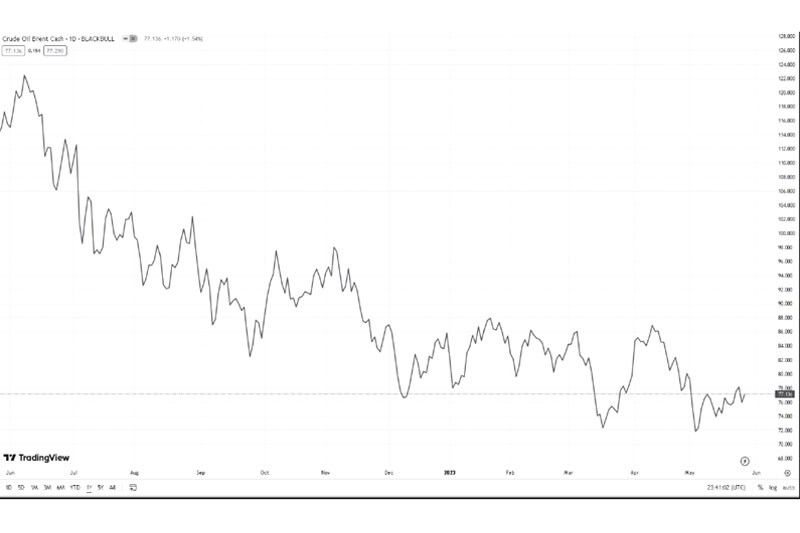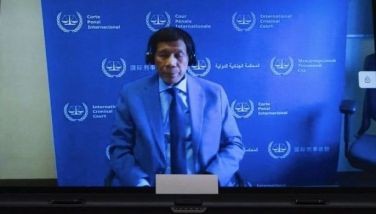Watch out

Last week, investors were spooked by a potential cut in OPEC+ output. Oil prices rose amid fierce warnings made by Saudi Arabia’s energy chief to oil speculators.
“They will be ouching”
Saudi Arabia’s energy minister, Prince Abdulaziz bin Salman, threatened short sellers of oil and warned them of impending pain. He said, “Speculators, like in any market, are there to stay. I keep advising them that they will be ouching. They did ouch in April. I would just tell them: Watch out!” These comments signal a potentially large output reduction which may come in the upcoming OPEC+ meeting on June 4. This would follow the output cut of 1.1 million barrels per day in April which caused oil prices to jump by 6.2% in one day. However, despite last week’s rally, oil is down 11% from its recent high in April.
Brent Crude Oil Spot – 1-year chart

Reasons why oil prices remain soft
Below, we enumerate the reasons why oil prices remain subdued despite a major output reduction by OPEC+ in April.
1. Muted economic rebound of China
2. Higher interest rates in the US and major economies
3. US dollar strength
4. Recent bank failures and resulting credit crunch
5. Fears of a global recession
6. Ongoing recession in Germany
7. US debt impasse and potential credit rating downgrade
8. Energy transition and shift to renewable energy
9. Growth of electric vehicles
Russia dashes oil rally
Last week, Russian deputy prime minister Alexander Novak made a number of comments that halted the oil rally. We share some of his quotes below.
“I don’t think there will be any new steps, because just a month ago certain decisions were made regarding the voluntary reduction of oil production by some countries due to the fact that we saw the slow pace of the global economic recovery.”
“Our task now is monitoring the situation on the market and reacting properly. We don’t have the task of inflating prices. There is a task of balancing the market to ensure the interests of both producers and consumers.”
While Saudi has to keep oil prices at $80/barrel to balance its budget, Russia needs to sell more oil in order to finance its ongoing war against Ukraine. Amid oil sanctions imposed by the West, there have been reports that Russia started to re-route supplies intended for Western markets to Asia-Pacific countries.
The other wars
As Russia’s military campaign against Ukraine continues, other forms of warfare are being waged around the world. These wars are not military but economic in nature, and they likewise have a major impact on global economic affairs. Saudi Arabia, Russia, and other oil-producing countries banded together to form OPEC+ in order to dictate oil supply and control prices. This is a direct affront and defiance to the US and western allies that would prefer lower oil prices to tame inflation and support economic growth. The US and China are embroiled in a trade war which has spurred a major technology battle. Because of its defense treaties with various countries, the US is partaking in military drills while also providing assistance to its allies. A possible military conflict may arise from the sovereignty issue between China and Taiwan, and the territorial disputes involving many countries in the South China Sea.
Far-reaching ramifications
Indeed, the world should carefully watch the next actions of OPEC+ as these would have far-reaching ramifications on the global economy. Western nations and OPEC+ have opposing interests and desired outcomes on the direction of oil prices. A continued ascent of oil prices would trigger a resurgence of inflation which in turn would necessitate keeping higher interest rates for longer. This may exacerbate the ongoing slowdown in major countries and tilt the global economy into a painful recession. A sharp climb in oil prices would be especially detrimental for oil-importing countries like the Philippines. On the other hand, a decline or stabilization in oil prices would support the easing of inflation in major economies and the pause in monetary tightening of central banks.
Philequity Management is the fund manager of the leading mutual funds in the Philippines. Visit www.philequity.net to learn more about Philequity’s managed funds or to view previous articles. For inquiries or to send feedback, please call (02) 8250-8700 or email ask@philequity.net.
- Latest
- Trending






























